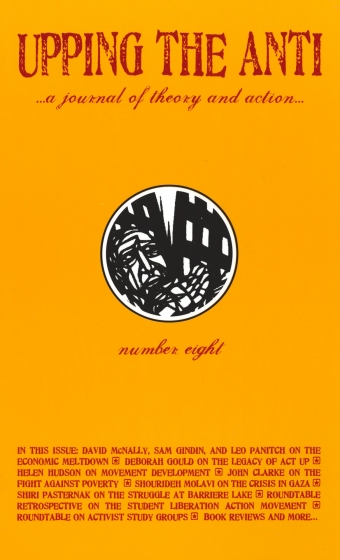Catastrophe and Actualization
Dear UTA ,
I was pleased to read your editorial, “The Moment of Danger: Catastrophe and Actualization,” in the last issue (UTA 7). “Crisis” under capitalism is certainly nothing new, as the editors point out. In this time of ecological and economic crisis, it is critical that anti-capitalists work rigorously to both make connections between the two and offer viable alternatives to the capitalist mode of production. You capture the essence of the problem quite well:
If we are committed not only to an analysis of today’s problems but to their resolution as well, we have to contemplate what forms of social labour would meet human needs (and allow for the historical development of human capacities) while – at the same time – working with a more intimate connection to the logic of nature’s own contributions to the production process.
The journal’s past work with anti tar-sands activists is a good start. I would very much like to see UTA dedicate a great deal more space not only to politics that stand against ecologically destructive production practices but to politics that point in the direction of creating new practices that, well, won’t kill us.
For instance, while hardly radical, it is nonetheless important to track some of the new relationships that have been emerging between organized labour and environmental coalitions. Traditionally pitted against one another, organizers from both camps are starting to realize that the exploitative conditions that give rise to the commodification of workers are fundamentally linked to the logic of ecological exploitation. I admit to being seduced by the potential that these new relationships hold. However, we cannot fool ourselves into thinking that this coalitional shift will not bow to the gods of economic growth unless pushed to do otherwise.
Van Jones, author of The Green Collar Economy: How One Solution Can Fix Our Two Biggest Problems and an early agitator for labour and environmental justice coalitional politics, sees no way out of this moment of crisis without solutions organized by the private sector:
There will surely be an important role for nonprofit, voluntary, cooperative, and community-based solutions… the reality is that we are entering an era during which our very survival will demand invention and innovation on a scale never before seen in the history of human civilization. Only the business community has the requisite skills, experience, and capital to meet that need. On that score, neither government nor the nonprofit and voluntary sectors can compete, not even remotely (86).
Unfortunately, this is the underlying philosophy that is currently driving the movement. It is incredibly important that UTA start to analyze organizations such as Green for All, The Blue-Green Alliance, and the Apollo Alliance, which operate under the umbrella of “green collar jobs” or the “green collar movement.” These organizations seem to have a lot of traction with the Obama administration and are considered the vanguard of the new “green economy.” I fear they are harnessing the lion’s share of movement energy and potential but operate under the assumption that capitalism can be green or that the best strategy for intervention is to work within the structure available to us.
My concern is that Van Jones is right. As mentioned in the editorial, actualization of ecological production processes outside the sphere of capitalist accumulation tend to be limited to the agricultural sphere. If this remains the case, anti-capitalists are wasting their chance at organizing during a critical juncture, one that has the capacity to fundamentally change the way we live our lives. The environmental justice movement and anti-tar sands and anti-mountaintop removal activists offer the most convincing arguments against the logic of capitalist accumulation within the environmental movement. But, again, when most radical energy is spent blocking destructive practices without offering models of ecologically sound production practices, then Green for All and similar organizations will appear to be our only solution.
A critical eye to the green collar jobs movement is vital, but it is not enough. UTA can function as an important space in which to brainstorm ways North American activists can lend new voice to these critical debates and new direction to organizing energies. The open-ended conclusion of your editorial gives me hope that it will.
In Solidarity,
Heather Hax
Toronto, ON

